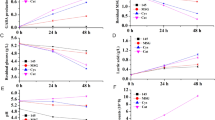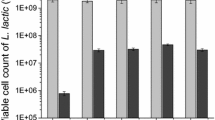Abstract
Leuconostoc mesenteroides is a commercially important lactic acid bacterium currently used as a starter for kimchi and kefir. However, its sensitivity to acid stress limits its performance. L. mesenteroides was grown in a medium supplemented with 3.2 or 6.4 mM glutathione (GSH), and cell survival rates were measured during a long-term mild acid challenge (pH 4.0). As a result, GSH was imported by the cells and protected against acid stress; thereafter it was consumed as a nutrient. Acid stress resistance of starter cultures of this bacterium can thus be improved by cultivating it in media supplemented with GSH.




Similar content being viewed by others
References
Chesney JA, Eaton JW, Mahoney JR (1996) Bacterial glutathione: sacrificial defense against chlorine compounds. J Bacteriol 178:2131–2135
Doeven MK, Kok J, Poolman B (2005) Specificity and selectivity determinants of peptide transport in Lactococcus lactis and other microorganisms. Mol Microbiol 57:640–649
Duwat P, Cesselin B, Sourice S, Gruss A (2000) Lactococcus lactis, a bacterial model for stress responses and survival. Int J Food Microbiol 55:83–86
Eom HJ, Park JM, Seo MJ, Kim MD, Han NS (2008) Mornitoring of Leuconostoc mesenteroides DRC starter in fermented vegetable by random intergration of chloramphenicol acetyltransferase gene. J Ind Microbiol Biotechnol 35:953–959
Gregus Z, Nemeti B (2005) The glycolytic enzyme glyceraldehyde-3-phosphate dehydrogenase works as an arsenate reductase in human red blood cells and rat liver cytosol. Toxicol Sci 85:859–869
Kim EK, Cha CJ, Cho YJ, Cho YB, Roe JH (2008) Synthesis of γ-glutamylcysteine as a major low-molecular-weight thiol in lactic acid bacteria Leuconostoc spp. Biochem Biophys Res Commun 369:1047–1051
Kristek S, Bešlo D, Pavlović H, Kristek A (2004) Effect of starter cultures L. mesenteroides and L. lactis ssp. lactis on sauerkraut fermentation and quality. Czech J Food Sci 22:125–132
Lee K, Pi K, Kim EB, Rho BS, Kang SK, Lee HG, Choi YJ (2010) Glutathione-mediated response to acid stress in the probiotic bacterium, Lactobacillus salivarius. Biotechnol Lett 32:969–972
Li Y, Hugenholtz J, Abee T, Molenaar D (2003) Glutathione protects Lactococcus lactis against oxidative stress. Appl Environ Microbiol 69:5739–5745
Makarova K, Slesarev A, Wolf Y, Sorokin A, Mirkin B, Koonin E, Pavolv A et al (2006) Comparative genomics of the lactic acid bacteria. Proc Natl Acad Sci USA 103:15611–15616
O’Sullivan E, Condon S (1997) Intracellular pH is a major factor in the induction of tolerance to acid and other stresses in Lactococcus lactis. Appl Environ Microbiol 63:4210–4215
Sherrill C, Fahey RC (1998) Import and metabolism of glutathione by Streptococcus mutans. J Bacteriol 180:1454–1459
Zhang J, Fu RY, Hugenholtz J, Li Y, Chen J (2007) Glutathione protects Lactococcus lactis against acid stress. Appl Environ Microbiol 73:5268–5275
Zhang Y, Zhang Y, Zhu Y, Mao S, Li Y (2010) Proteomic analyses to reveal the protective role of glutathione in resistance of Lactococcus lactis to osmotic stress. Appl Environ Microbiol 76:317–3186
Acknowledgment
This study was supported by the Korea Research Foundation Grant (2009-0085901) funded by the Korea Government (MEST).
Author information
Authors and Affiliations
Corresponding author
Rights and permissions
About this article
Cite this article
Kim, J.E., Eom, HJ., Kim, Y. et al. Enhancing acid tolerance of Leuconostoc mesenteroides with glutathione. Biotechnol Lett 34, 683–687 (2012). https://doi.org/10.1007/s10529-011-0815-1
Received:
Accepted:
Published:
Issue Date:
DOI: https://doi.org/10.1007/s10529-011-0815-1




